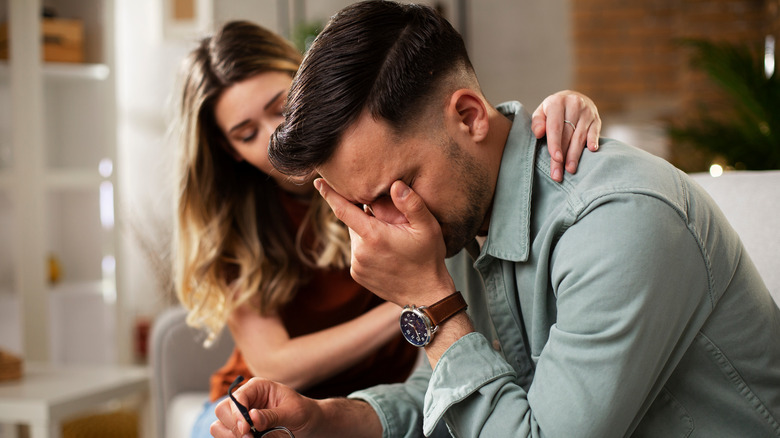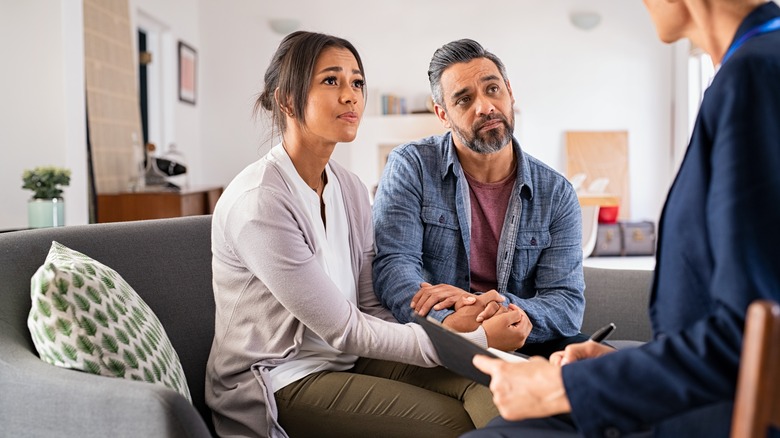Tips For Being In A Relationship When One Partner Experiences Depression
The following article discusses symptoms of depression and suicide.
It can be hard to know exactly what to say to someone who is experiencing depression, especially when that someone is your partner. Having a significant other with depression can be complicated — many people have undiagnosed and untreated depression and try to keep their symptoms from affecting all aspects of their lives. In couples where one partner has depression, both parties are more likely to experience a lack of communication, isolation, decreased intimacy, and uncertainty in their relationship (per PsychCentral). If you and your partner are experiencing repercussions of their depression, it's important to remember that it's not their fault. The National Institute of Mental Health reported that depression is a medical condition that affects 7.1% of adults in the United States, per the Depression and Bipolar Support Alliance.
A depression diagnosis does not indicate the end of your relationship. Whether your loved one is beginning to show signs of depression or they have already been diagnosed, there are many ways for you to be a beacon of support and assistance. It will require patience, understanding, and learning from both parties to navigate your new normal. But with these tips, you and your significant other can emerge stronger than ever.
Recognize their symptoms and triggers
We all get a little down every now and then, but experiencing depression is much more than the occasional mood swing. People with depression often show distinct symptoms that can be extremely dangerous if they are dismissed. According to WebMD, your partner may be depressed if they have lost energy or interest in things they used to enjoy, have trouble sleeping and focusing, are extremely quick to anger, or are crying more often than normal. You may notice that your partner has less interest in being physically intimate, and they are coping with their feelings in unhealthy ways like drinking and drug use.
Some people battle chronic depression their whole lives, while others experience it after traumatic experiences. When you are observing your partner and looking for possible signs of depression, consider any stressors or recent life events they may be experiencing. Have they recently lost a loved one? Are they feeling unfulfilled in their career? Did they recently give birth and are experiencing postpartum complications? Depression manifests differently in everyone, so it's important to pay attention to how your partner is coping. Understanding where their depressive symptoms stem from is the first step toward showing them empathy and finding a path forward.
Learn how to best support them
Knowing how to best support your partner when they're depressed will take a lot of time, patience, and listening. If you have never experienced depression first-hand, you may have a hard time understanding why your partner is struggling — it might seem like they are overreacting to things or aren't trying hard enough to address their symptoms. But one of the worst things you can expect from a person experiencing depression is to "just get over it." Diminishing their experience will only further any divides in your relationship. Instead of expecting them to feel better in ways that work for you, try learning about what makes them feel better when they are feeling low.
Let your partner know that you're willing and able to listen to them about what they are feeling. Sometimes, simply talking openly about what is hurting can be helpful for people experiencing depression. Make sure that you're listening without judgment, and try your best not to give your own input and advice. Even if you think you know exactly how to fix their problems, sometimes they might just need someone to listen or a shoulder to cry on. If you do feel the need to verbalize your support, PSYCOM recommends using phrases like, "I am here for you," "We will get through this together," and, "Tell me what I can do to help."
Know when and how to seek professional help
When approaching your partner about the possibility that they might be depressed, it's important not to ambush them. Reflect on your own feelings and experiences rather than their actions by using "I" statements, and communicate to your partner that you love and support them no matter what. As you and your partner navigate through their depression, you do not have to do it alone. When you think it's time for a mental health professional to join the conversation, try easing into the suggestion without judgment. Be open with your partner about your limits when it comes to your knowledge and experience dealing with depression, and underline that seeing a professional may help you both learn how to better understand and cope with their depression. Remind them that seeking professional help does not indicate that there is anything inherently wrong with them — many mental health experts believe that everyone could benefit from seeing a therapist, regardless of whether or not they have a mental illness.
Seeing a therapist does not replace your role in your partner's recovery. Instead, it gives the two of you even more tools to use when depression affects your relationship. Consider attending couples counseling if one-on-one therapy seems too overwhelming for your partner at the moment. You can also ease into the possibility of seeking treatment by talking to a depression hotline or consulting with other trusted loved ones who have experienced depression.
Practice patience if your partner is resistant
Discussing the possibility that your partner is depressed will most likely not be an easy conversation at first. Even when you present the information gently with the best intentions, your partner may be resistant to discussing their symptoms. They might refuse to accept that they are experiencing depression or accuse you of being critical. It is easy to understand why they might feel defensive and hurt, especially if they have not noticed their symptoms themselves.
It's important to remember that your partner is in a vulnerable place, and they are likely feeling embarrassed, confused, and hurt. When their reaction to seeking help is less than ideal, try not to stoop to their level. Responding to their negative emotions with the same energy will cause the two of you to be on opposing sides of a conflict rather than a team addressing depression together. Per WebMD, Dr. Jacques Barber, Ph.D., reminds us, "Depression isn't contagious. This won't last forever and can be treated. It's easy to blame yourself. But most couples do survive this."
As difficult as it might be in the moment, continue to be there for your partner. Planting the seed about their signs of depression will most likely take time to water and grow. Show them that you genuinely care about their well-being by being patient and asking them what they need. Over time, they'll be more open to discussing the possibility of help — thanks to your reassurance and active support.
Prioritize your own well-being
Prioritizing your significant other is important when you're both navigating through and learning about their depression, but taking care of yourself should never fall off your to-do list. Psychologist Xavier Amador told The New York Times, "If you're living with somebody who is depressed and feeling helpless — and often doesn't want to get help — then you can start to feel depressed and helpless." Sacrificing your own sanity and well-being in the process of caring for your partner may cause additional stress and anxiety that negatively impact your physical and mental health.
Keep in mind that your loved one's depression is not your fault. Sometimes, people in otherwise unhappy relationships will feel obligated to stay out of fear that their partner will harm themselves if they leave. If your partner is experiencing suicidal thoughts, getting them the proper help is critical. But their feelings of depression and suicide should never be a reason for you to stay with them. If you feel that you and your partner are no longer compatible as a couple, it is okay to prioritize your own happiness and end the relationship.
If you or someone you know needs help with mental health, please contact the Crisis Text Line by texting HOME to 741741, call the National Alliance on Mental Illness helpline at 1-800-950-NAMI (6264), or visit the National Institute of Mental Health website.
If you or anyone you know is having suicidal thoughts, please call the National Suicide Prevention Lifeline by dialing 988 or by calling 1-800-273-TALK (8255).





